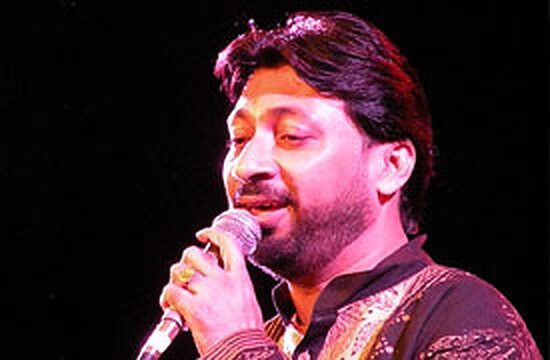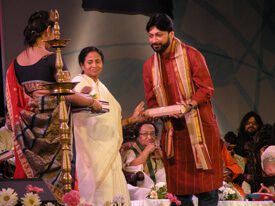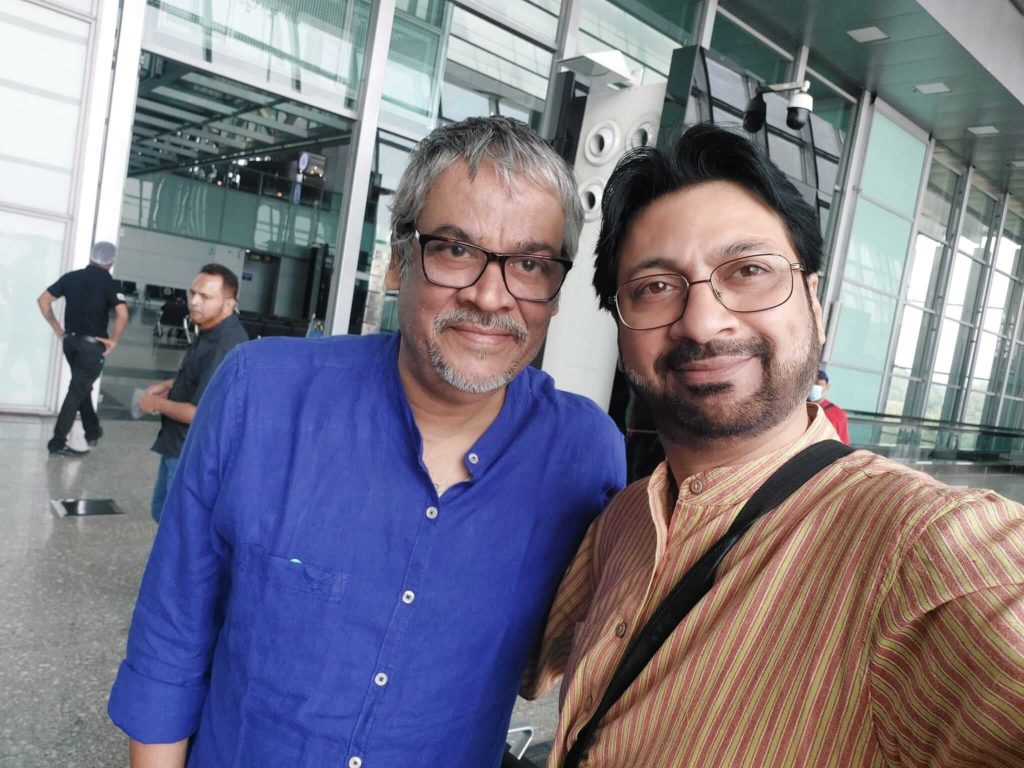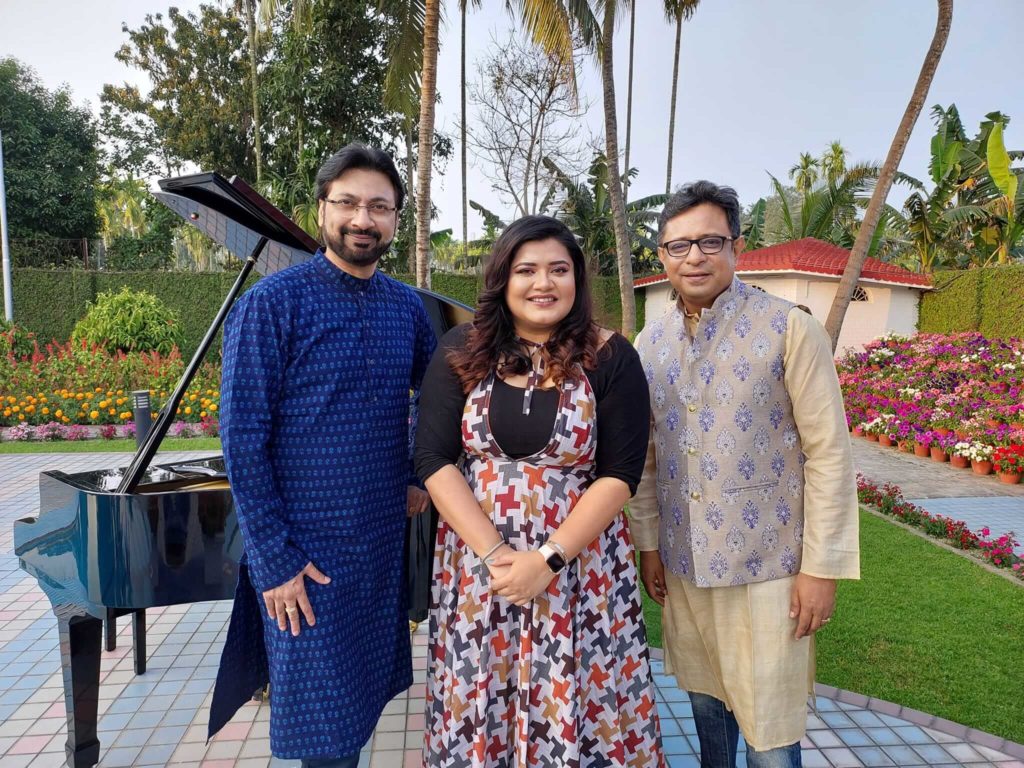Reading Time: 6 minutes
Manomay Bhattacharya is a scion of the legendary Jadu Bhatta. His music conquers the hearts of the listeners. Ruchira interviews him about his life and times, exclusively for Different Truths.
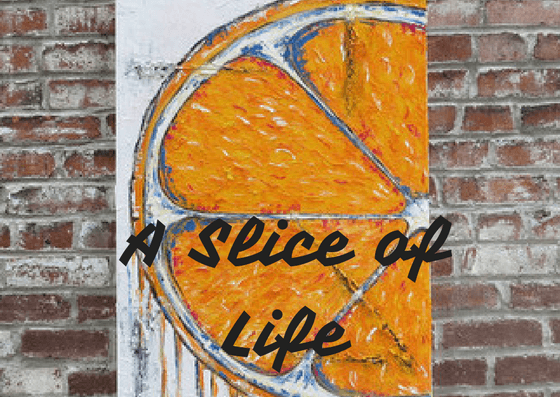
Manomay Bhattacharya is a familiar a face on popular Bengali television entertainment channels. Few may be aware, but he is a scion of legendary JaduBhatta (Bishnupur, West Bengal) gharana of classical music. Music came to him almost from the cradle, his parents themselves being pupils of doyen such as Subinoy Roy and Ratneswar Mukherjee. He lends his voice for playbacks in several Bengali flicks, commercial or otherwise. He has 25 (and still counting) musical albums – covering on a medley of music – to his credit
On a personal note, I have been an ardent fan of Bhattacharya for ages now. I feel his best renditions are Tagore (Bipode more roksha karo) and Rajanikanta (Tumi nirmal koro) ditties. I I was fortunate to catch some of the recent films for which he did the playback. The good-looking, bearded, soft-spoken gentleman appears very serious about life and is deeply engrossed in music.
Back home, after a successful tour of neighboring Bangladesh he readily agreed for an interview. I was on cloud nine when the famous voice floated across the phone, asking me to come over to his home. I would have loved to, but I live in the National Capital Region (NCR). So over the phone, the versatile singer Manomoy (meaning conqueror of hearts) candidly spoke about music – the prime passion of his life, his joys experiences and hopes…
Ruchira: Your first gurus were your parents. Obviously, there was music at home…what made you decide to adopt music as a full-time profession?
Monomoy: Well, I did not determinedly adopt music as a profession per se, never gave it a serious thought. It was always there everywhere around me. I was keen on singing just the way I was keen on playing in football tournaments. Gradually, I realised that people were recognising and appreciating my singing. From time to time, I would participate in several competitions and won prizes. So, finally I told myself since the going is good so far I might as well cast my lot with it. But yes, my father had a secret desire: he wanted me to become a singer. So that’s the way it has been.
Ruchira: Who were your subsequent Gurus?
Monomoy: After my parents, I had my first music lessons as a kid from Bibhuti Bose and Benukumar Dobey. In my pre-teen years, (1979-1998 to be precise) I received uninterrupted training in music from Biman Mukhopadhyay. Thereafter, as I stepped into adolescence and my voice underwent natural changes, I began learning Classical music under Jayanta Bose. In the succeeding years, I dabbled in diverse musical genres —Nazrul Geeti, Rajnikanta, Atulprasad, Dewijendra Geeti, Ragpradhan, Bhajan & adhunnik/modern Bengali songs under the tutelage of stalwarts like Sukumar Mitra, Dilip Roy, Anal Chattopadhyay, Sanjay Chakraborty, Jatileshwar Mukhopadhyay, Pandit Ajay Chakraborty among many …
Ruchira: Please shed some light on the Jadu Bhatta parampara /tradition, which you are a part of?
Monomoy: My knowledge about Jadu Bhatta hardly goes beyond the knowledge and information available in public domain. Nevertheless, my father would narrate anecdotes about this maverick genius, who wondered from one place to another and how he ended up being a court musician in erstwhile royal/ princely families. But I proudly acknowledge the fact that his blood courses through my veins, his cultural heritage and legacy is a boon for me though I am unsure as to how far I have succeeded in cherishing and upholding it.
Ruchira: Which genres of music do you dabble in? And What is ‘Tagore’ for you?
Monomoy: The music industry has employed my voice for all kinds of songs – devotional, adhunik (modern) Nazrul geeti, Atul Prasad and so forth. Whichever genre of song I may take up, I personally feel nothing is complete, there remains a void if I don’t round off a programme without Rabindra sangeet. They have a certain kind of cleansing, purifying effect on my very being. For me Tagore’s songs offer Praner araam moner ananda (life’s bliss comfort, mind’s joy).
Ruchira: Hindustani Classical is considered the pivot point of Indian music. Your take on this.
Monomoy: Exactly. You couldn’t be more right. I would like to emphasise the fact that if an individual wants to be a successful singer he must train under a guru/ustaad for a considerable length of time, a minimum 10-12 years at a stretch. Otherwise, you will reach nowhere.

Award from WB govt 
with Srikanta Acharya 
with Ujjaini Rupankar
Ruchira: Please share your experiences in /views on playback singing.
Monomoy: In my adult life, the first film that I sang for wasRituporno Ghosh’s Shuvo Maharat. It was fun working for Rituda since he understood music very deeply. Later,I sang for the CD of Jaatiswar, for Shankhachil …. Also, I recorded several numbers under the guidance of Kabir Suman. I have lent my voice to movies directed by Bimal Bose and Subodh Mukhopadhyay. I also sang for Aparna Sen’s films e.g., Ghare Baire Aaj and the multi-starrer Bosu Poribar (Bhromor koiyo giya). Moreover, I did playback for a commercial movie, Rangbaaz. Honestly, it has been a great experience. For a singer, each song each new task. It is a challenge. I have always enjoyed such challenges and endeavoured to put forward my very best.
Ruchira: Any plans to try your hand in playback for Bollywood?
Monomoy: No. Never, not at all (laughs). I am pretty much happy comfortable and satisfied with my status and situation here in Kolkata and Bengal. People love and appreciate my songs. Moreover, in Mumbai, I hardly have any contacts, nor do I have any place to stay. So, I avoided taking a plunge into an uncertain future and decided to stay put in my comfort zone.
Ruchira: Some of your memorable performances in India and abroad?
Monomoy: I remember my solo performance at Kolkata’s Rabindra Sadan where I sang to a packed house. Those who were denied entry into the auditorium thronged the corridor to hear me sing. I have travelled abroad in connection with performances, many, many times. But I clearly remember the first time when I sang at New York’s Madison Square before a ten thousand strong Bengali audience. It was indeed an exhilarating experience for me. I still harbour a sense of nostalgia for this performance. Thereafter, I have sung in many other cities around the globe but being the first, this one stands out in my memory.
Ruchira: Some of your popular music albums?
Monomoy: Some of my popular albums include Onyo Manomoy Abaro Monomoy, Amar gaan, Ghash Phoring, Trishna Moner Manush. I guess I have about 25 of them.
Ruchira: Your greatest achievement in life?
Monomoy: Appreciation, love, and affection of the masses. My musical career spans 25-26 years. The fact that people still enjoy hearing me sing and keep inviting me to perform at numerous public functions and live shows makes me feel overwhelmed.
Ruchira: Any regrets?
Monomoy: Regrets? (Laughs)What is the point of talking about them now? However, I feel that had I been born and lived in the era of Hemanta,Manna Dey, and such like, I think the music industry would have been able to harness my skill and talents to greater degree than it does at present. When I began pursuing music, the milieu and the time were perhaps not opportune. Time is an important factor, you see. Also, I have realised that smart and outgoing individuals who go all outto promote themselves are highly successful commercially, while the quieter, unassuming people tend to lag.
Ruchira: Your views on the current music scenario in India?
Monomoy: Overall, it’s a good scenario. There are good quality songs being created. There are bad songs being churned out as well. (Laughs) That’s the way life is, I guess. But I must say that the attitude towards music /songs has changed drastically. When we were younger, hearing songs broadcast on radio was sheer delight. This practice is now defunct. Nowadays, people listen to songs on YouTube and social media. The trend nowadays is: one song at a time. Plus, there is more emphasis on the visual aspects. Nowadays if you want your song to be an instant hit you must arrange for good videos. All these changes dampen the joy listening to any song and imbibing it within you.
Ruchira: Will your son Akash be stepping into your shoes as a singer?
Monomoy: He has already made his foray into the musical arena. However, I am determined not to exert even the smallest degree of pressure on him in any way. He is free to carve out a career of his choice in whichever field he wants.
Ruchira: What are your future plans?
Monomoy: Once I retire from active public life (singing), I guess I am going to be much more relaxed and am likely to have more time on my hands. So, what I plan to do is devote my heart and soul in teaching youngsters with great potential (though not so well off), hone their skills and prepare them to carve out successful career in future
Ruchira: Your message to the audience of Generation X and upcoming generations?
Monomoy: I would like to say: Please listen to all kinds of music, focus on good quality music, listen with your heart mind and soul. Concentrate on listening to music alone, which is far more important than videos.
Photos sourced by the interviewer

